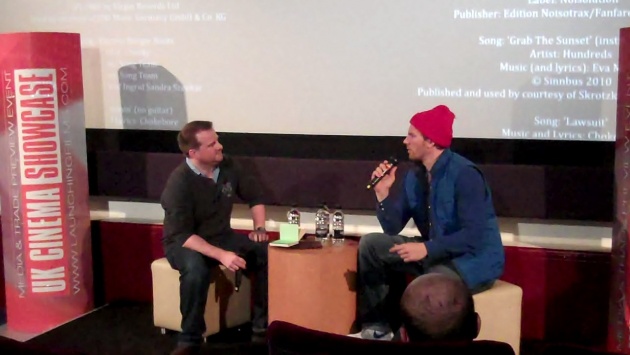
'Only this hat is real,' explains Marten Persiel, director of THIS AIN'T CALIFORNIA
When is a documentary not a documentary? Certain films like ZELIG and THIS IS SPINAL TAP announce themselves as appropriating the form. You appreciate the pastiche. Then there are films that are about subjects that you know nothing about, namely the skateboarding scene in East Berlin, in particular the enigma that is Denis Paraceck (1970-2011). Only you discover that the man doesn’t exist, and according to imdb may have been played as an adult by the male model Kai Hillebrandt.
If it had had a caption declaring that prototypical rebel East German skateboarder Denis ‘Panik’ Paracek wasn’t real, but a composite, then THIS AIN’T CALIFORNIA might have been easier to take. This ‘documentary tale’, director Marten Persiel’s own description, is actually tremendously enjoyable. What you want besides the story is to believe that you are being told something close to the truth. However, Persiel’s acknowledgement that he took a bunch of footage and mixed it with his own – 50% of the film is faked – diminishes the experience.
What’s the big deal? Well, Paraceck is presented as a champion junior swimmer who turned his back on his sport to ride four wheels on a homemade board, upsetting his strict disciplinarian dad in the first place. You root for him. The film begins, incredibly plausibly, with a group of friends and acquaintances, leaving his funeral to reminisce about him at an old skate park. They conduct their conversations to each other, not to the camera, as we learn about the boy that we first see on a board holding onto a rope and hanging on to the back of a moving car.
How did they get the Super 8 footage? One of the parents had a good job.. How did they get it developed? That question isn’t answered. Persiel fills in some of the blanks with animated scenes. For instance, Denis leaps out of his apartment window onto a tree. ‘A typical Denis story,’ we are told. This should have alerted us to the idea that all is not real in this narrative.
Still, the black and white animation does feel that it is rooted in reality – strange but true – namely because we are used to the convention from films such as WALTZ WITH BASHIR. You believe it is based on a story shared by Denis’s friends – he grew up with two boys his own age, one of whom had a glamorous techno pop singer mother. The year is 1985 as the makeshift boarders thrived on their kit. ‘Some of the roads are 50% skin,’ reminisces one of the friends, referring to the injuries suffered by skater boys. In retrospect this is another clue to the deception that the film contains 50% untruth, the non-skin.
Denis quits swimming altogether after one of his friends moves to central Berlin. A skating scene emerges in Alexanderplatz (on the West German side). Some of the East German buildings lend themselves to sliding down angled roofs. Denis grows into a young man, attempts unsuccessfully to be a skateboard tutor – we see the training camp burn down through animation – then re-christen himself as Panik the rebel, attracting the attention of a journalist from Thrasher magazine.
The dramatic highpoint is a skate contest in Prague, when one of the men reminisces that he saw Mark Gonzales. Panik made an impression; when he walked in, a food fight started. The East German boys were told that they could not mix with the West Germans, but the DDR boys expressed solidarity with their GDR counterparts.
Panik didn’t win anything except an unofficial charisma contest, but as we see him setting off a fire extinguisher and misusing a hose, we are captivated by his unstoppable, almost feral youthful exuberance.
After a fantastic interlude in which Western skate parts are smuggled into the East by the son of a diplomat, the film builds to a West meets East skate contest in East Germany, during which Panik is arrested.
I have not even told you about the Hurrican Trio, a skate dancing group, accompanied by DJ Laser and the kids’ first apartment. Nor have I mentioned Patrick, a moustache-toting, crinkled haired cross between Patrick Dewaere and Matthew McConaughey – a JK Skatin if you will.
There are a whole bunch of unanswered questions about how the skater drop outs survived in a country where many were under surveillance. The fast editing and techno soundtrack go some way to infecting you with the skateboarders’ adrenaline addiction. We are told that Denis became a soldier and died in Afghanistan in 2011, aged 41, but only afterwards you think ‘isn’t he too old to be a soldier and why don’t we hear from his colleagues?’
So there was no skater boy who linked East with West and stood as a symbol for ‘freiheit’, prefiguring the fall of the Berlin. Like some say of God, it was necessary to invent him. I enjoyed the deception while it lasted, but false histories do us no good at all. I can’t help but think that in some way this is Germany’s response to the counter history that was INGLOURIOUS BASTERDS.
Reviewed at Vue Piccadilly, Cinema Showcase, 11:00am, Sunday 24 November 2013; with thanks to the Film Distributors Association



